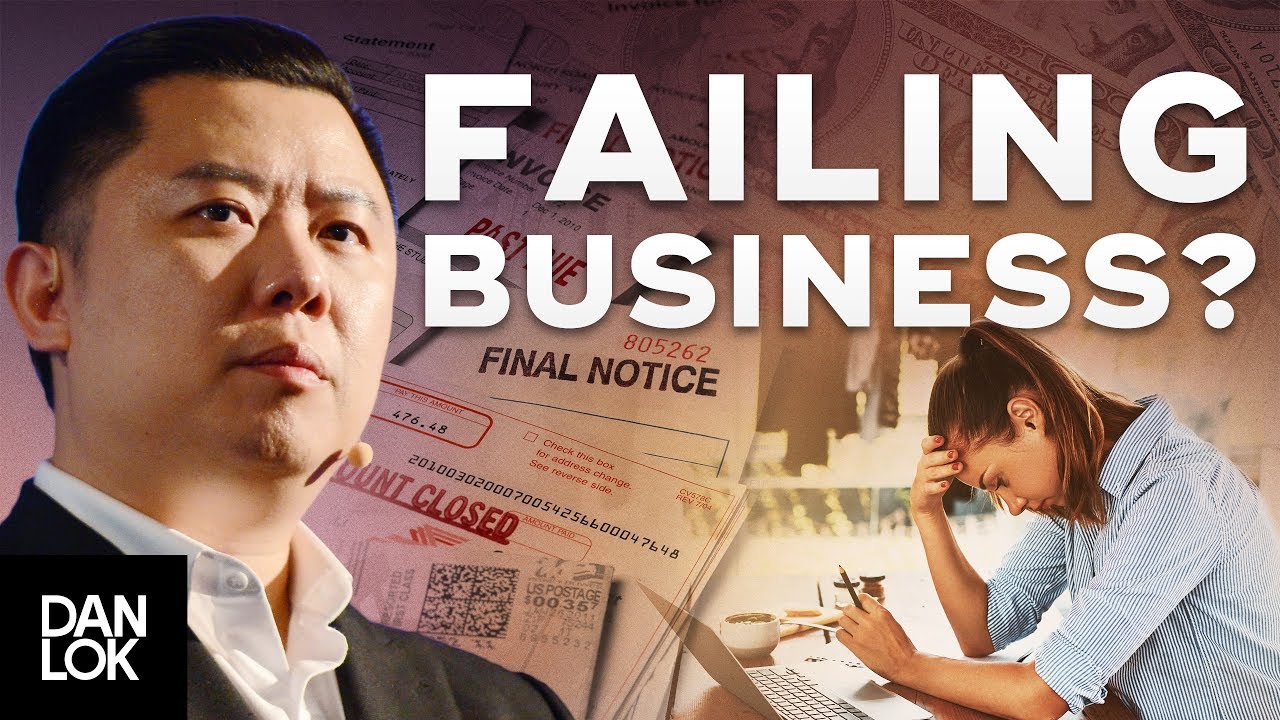The most important thing to realize is that your businessfailed, but that doesn't make you a failure. Failure is a chance to take everything you've learned and use it in a new situation or job. If you want to know what to do when your business fails, you are in the right place.
Most people who are good at the businesshave had one or two businesses fail. Remember that being an entrepreneur comes with a lot of risks and that taking failures with a change in perspective can lead to more success in the long run.
There are, of course, ways to avoid this. Some people who try to start a business for the first time are successful. But let's say that your first business doesn't work out. How should you handle this situation if you want to improve your chances of being a successful business owner in the future?
Why Is My Business Failing?
There are almost an infinite number of things that could be wrong with your business. You should talk to key people in your business, like senior employees, your accountant, and your business advisor, to get a better idea of what's going on.
As the owner or director of a business, you are often too close to it to see where the problems are. Talking to these people will give you more information and help you figure out what's really wrong. Some of the most common reasons why a business fails are:
- Not enough people want to buy or use what you have to offer.
- You're not meeting your customers' needs.
- There's no clear way to make money.
- The company is growing too fast.
- You have moved away from what you do best.
- Too much moneyis being spent.
- You can't keep a healthy amount of cash coming in.
- You don't keep the right books or tax records.
- The business isn't in the right place.
- Few or no business plans are made.
- Your marketing doesn't work.
- You chose the wrong people to hire.
- You chose the wrong people to do business with.
- The business isn't making money the way it is now.
- You have trouble getting customers to pay you when they should.
There are so many different things that can go wrong with a business that there is no one-size-fits-all way to fix it. But there are a number of tried-and-true ways to save your business that will help it stay afloat.
5 Signs Of Business Failure

5 Signs A Company Might Be Failing
Declining Sales
For a small business to be successful, sales have to go up every year and at a faster and faster rate. If the rate of sales growth slows down a lot or, even worse, if sales go down from one year to the next, it could mean that the company could fail.
The situation could be fixed by changing the company's marketing strategies and methods and by changing the way it tries to get customers to buy. In either case, for the business not to fail, the owner must change the mix of products or services the company offers to be more in line with what customers want now.
Rise In Customer Complaints
If a company starts getting a lot of complaints from customers who are unhappy with their purchases or the service they got after they bought something, this is a sign that things could go wrong. A quick drop in customers can be caused by a drop in customer satisfaction.
The business owner and her staff need to figure out the main reasons why customers are unhappy and make changes to the way the business works to fix them.
Cash Shortfalls
Most small businesses find that some months are better than others when it comes to cash flow. A company may have a cash deficit in a given month if the money it spent is more than the money it made.
The company's credit lines can be used to make up for a one-time deficit. But deficits that last for months show that there are serious problems with the business. If the company runs out of cash and can't borrow more, it will probably fail.
Loss Of Important Clients
When one of a small number of important customers goes to a competitor, it can be very bad for a business that depends on those customers for most of its income.
The business owner needs to figure out quickly why long-time customers are leaving and make changes to the way the company does business to stop more customers from leaving.
Drastic Spending Cuts
To a company's employees, competitors, and suppliers, a CEO's decision to cut the number of workers or administrative staff is a sign that the company's finances are getting worse and that it might go out of business.
Cutting costs only works to a certain degree; not a way to get the company back on track to growth and financial health. For example, cutting the budget for marketing can cause the business to lose more market share, make less money, and make it more likely that it will fail.
What To Do When Your Business Fails?

What To Do When Your Business Is Failing
Shut Down Correctly
Make a list of everything you need to do to close down your business before you leave. You can get help with this process from a lawyer or a financial advisor.
This means you have to pay your taxes, pay your employees, and close your books in the right way. If you don't do any of these things, you could get fined and risk hurting your reputation.
Look After Yourself
Take care of yourself after you've closed up shop. When a business fails, it can feel like a friend has died. You don't have to tell people right away why your business failed if they ask.
Figure Out What Went Wrong
Do a post-mortem on your business as soon as you can stand it. Look at your failure, figure out what went wrong, and figure out what the biggest problems were.
Start by giving a brief overview of how the business has been going. What did you hope to get out of it when it began? What did you end up getting? What have you made?
Were you not talking to your customers enough? Was your product or service really different from anything else on the market? Did you effectively communicate your value propositions? These are some of the most common reasons why businesses fail, so ask yourself if any of them apply to yours.
Make sure all partners and employees are a part of the post-mortem. You may have missed something important that caused the business to fail. Someone else will have to explain to you how and why those blind spots hurt the business. Having a neutral person in the room can help make sure this conversation stays civil.
Be fair in your evaluation. You don't want to think too much about your past mistakes, but if you don't stop to learn from them, you'll make the same ones again.
Once you know what went wrong, it will be easier to decide if you should change your original idea and try again, or if you should scrap the whole project and start over with a new idea.
Figure Out If You Need A Full-time Job Or Not
Before you jump into another expensive business venture, you should do a self-evaluation to see if it's a smart (and responsible) choice. If you have a family that depends on your income or a lot of debt from your last business, it may be best for you to get a steady full-time job, at least for the time being.
Get Your Finances In Order
Next, make sure you take care of your own money. If your business fails, you won't be able to rely on it as your main source of income, and if you had a lot of your own savings invested in it, you may lose them if the business fails.
Even if you have to file for bankruptcy, don't worry. You can still have a bright financial future, but you'll need to spend some time figuring out how tocut your costs and find a new source of income.
Get Pumped Up Again
Even the toughest entrepreneurs feel bad when their business doesn't work out, but you can't stay down in the dumps. Use this chance to get excited about being an entrepreneur again.
As you do a post-mortem on your business, make note of the tasks that made you happy and the ones that were a drag. Planning how to do as many of the fun tasks as possible and as few of the boring ones as possible can help you get really excited to start your next business.
Mentors can help get this process off to a good start. Listen to what gets them excited about their business, and then talk about where you are in your career. They will probably have some good business advice and ideas for how to relax and stay upbeat.
Change How You Do Things The Next Time
Many business owners who fail the first time will try again. She says that before you start a new business, you should make sure your business plan has an exit plan that explains what will cause you to close the business or sell it. This will protect your personal finances.
Make sure that you, your family, and your finances are all ready for you to try entrepreneurship again. Think carefully about the people you worked with on your last team and reach out to the ones you'd like to work with again.
And when you launch, be honest with your peers, staff, and investors about the problems you're facing, because they're there to help you solve them. Lastly, don't be afraid of failing. Even businesses that don't go out of business will fail in some way.
People Also Ask
Can A Business Survive Without Profit?
Profitability and growth are both important for a company to do well and stay in business, as well as to stay interesting to investors and analysts. Profitability is important for a business to stay in business, but growth is more important for long-term survival.
What Are 3 Common Reasons Businesses Fail?
Most small businesses fail because they don't have enough money or capital, can't keep a good management team, have a bad infrastructure or business model, or try to market themselves and fail.
How Do You Handle A Failed Business?
- Have a plan.
- Find things that can make you feel better.
- Don't make decisions based on how you feel.
- Have a strong network of people who can help you.
- Reevaluate your situation.
- Don't be too hard on yourself.
- Separate your failure from who you are as a person.
- Don't think about it.
Conclusion
At first, failure can be scary, but it doesn't have to be the end of the world. It is possible to get back on your feet, but you have to work at it and decide to accept what happened and move on. Learn, change, and keep going until you reach your goals.
Don't believe that business failure will keep you from being successful in the future. Many entrepreneurs see their first failure as the first step on a long road that can lead to a much higher success rate. Now you know what to do when your business fails.
